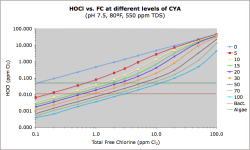It has been a long time since I posted anything on here…lessons learned here have served me well and made it easy!
I came across this article. Hope it is ok to introduce it like this.
I found this article very interesting because my pool seems to like it when pH is 7.7-7.8 and alkalinity is allowed to go where it wants. Trying to maintain lower pH dramatically increases acid use.
I am interested in your take on the article and discussion of HOCl and OCl. Hope you are able to read it.
Hope you are able to read it.
Thanks
I came across this article. Hope it is ok to introduce it like this.
I found this article very interesting because my pool seems to like it when pH is 7.7-7.8 and alkalinity is allowed to go where it wants. Trying to maintain lower pH dramatically increases acid use.
I am interested in your take on the article and discussion of HOCl and OCl.
 Hope you are able to read it.
Hope you are able to read it.Thanks









